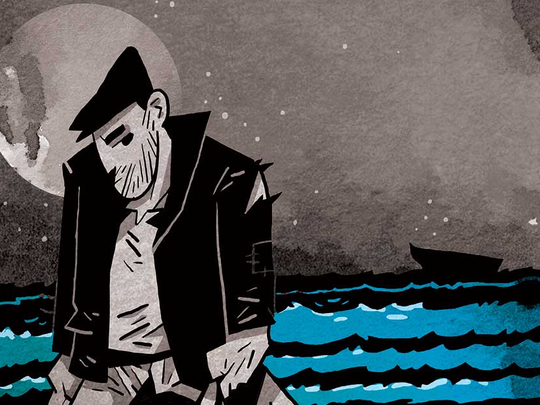
By Donal Ryan, Doubleday, 192 pages, £12.99
There comes a moment in every novelist’s career where they must decide whether to plough the same furrow that has brought them great success or make their way cautiously into another field, uncertain whether the soil on neighbouring land is as rich. In his fourth novel, Donal Ryan has not only bounded over a wall into new territory, but built himself a castle there.
It’s astonishing to realise that Ryan’s first novel, The Spinning Heart, was published only six years ago. Since then, across three novels and a story collection, he has displayed a sympathy for the voices of the dispossessed that few writers ever develop.
His debut was narrated by 21 victims of Ireland’s economic crash; he introduced readers to Johnsey Cunliffe, the isolated and troubled young man at the centre of The Thing About December. Then, along came Melody Shee in All We Shall Know, who found solace with a younger man, Martin Toppy, a Traveller: a character often seen and persecuted in Irish life, but still under-represented in Irish fiction. And so, when the opening section of From a Low and Quiet Sea introduces its first protagonist, and he is not named Seanie, Mick or Peadar, but Farouk, readers will recognise that Ryan has decided to try something a little different.
The novel is divided into four sections, the first three of which feature characters whose stories initially appear to have no relationship to each other.
Farouk is a Syrian refugee, escaping his homeland with his wife and daughter for what he hopes will be a brighter future in western Europe. Ryan keeps the pace deliberately slow, with long, dense paragraphs that are as absorbing as they are convincing. An educated man and a doctor, Farouk’s story develops in a manner that I suspect is painfully familiar to anyone who has been forced to flee the country of their birth under cover of night.
The next two sections find Ryan on more recognisable terrain. A young man, Lampy, recovering from his first broken heart, lives with his mother and grandfather while working in a care home, driving old people to and from hospital on a private bus. The tone switches dramatically here but the reader quickly warms to Lampy’s brutally honest, moving and often hilarious narrative.
Finally, there is the elderly John, an accountant and lobbyist filled with remorse over a failed relationship with a much younger woman. A money-wielding shyster, the sort whose illicit actions precipitated the dramas of The Spinning Heart, he is thrown off balance by an unexpected crush that quickly turns to obsession and violence.
The three stories are equally involving but it is only when the final section arrives that they are drawn together in the most heartbreaking manner.
There are revelations to be found in the closing pages, and connections between characters that took me by surprise — making me utter an expletive aloud in Dublin airport while reading, causing a woman sitting next to me to declare furiously, “May God forgive you!”, before picking up her carry-on luggage and moving somewhere less profane.
I struggle to think of a writer who has been so prolific and consistent in quality as Ryan, the best of the new wave of Irish authors to have emerged over the last decade.
His ability to understand the minds of young men stuck in small towns, longing for escape but unsure how to achieve it, is second to none. But he is also able to write about older people reliving the mistakes of their lives with compassion and a total lack of sentimentality. And throughout all his work runs a careful study of Ireland’s historical prejudices, combined with clear insights into what makes it such a peculiar, complicated and contradictory country.
Lampy and John figure alongside Johnsey as Ryan’s most vivid creations to date, but it’s Farouk who is the beating heart of this novel. He disappears after 50 pages, only to return at the end, but his presence hovers over every paragraph and we can almost sense him making his way slowly towards Ireland as we busy ourselves with the other two narratives.
This is a superb novel, from a writer building a body of work the equal of any today. His books are filled with love and righteous anger, most of which lurks darkly beneath the surface ready to explode like an ill-judged comment at a family gathering. Until now, The Spinning Heart was my favourite of Ryan’s novels. From a Low and Quiet Sea is better.
–Guardian News & Media Ltd
John Boyne’s latest novel is The Heart’s Invisible Furies (Doubleday).













